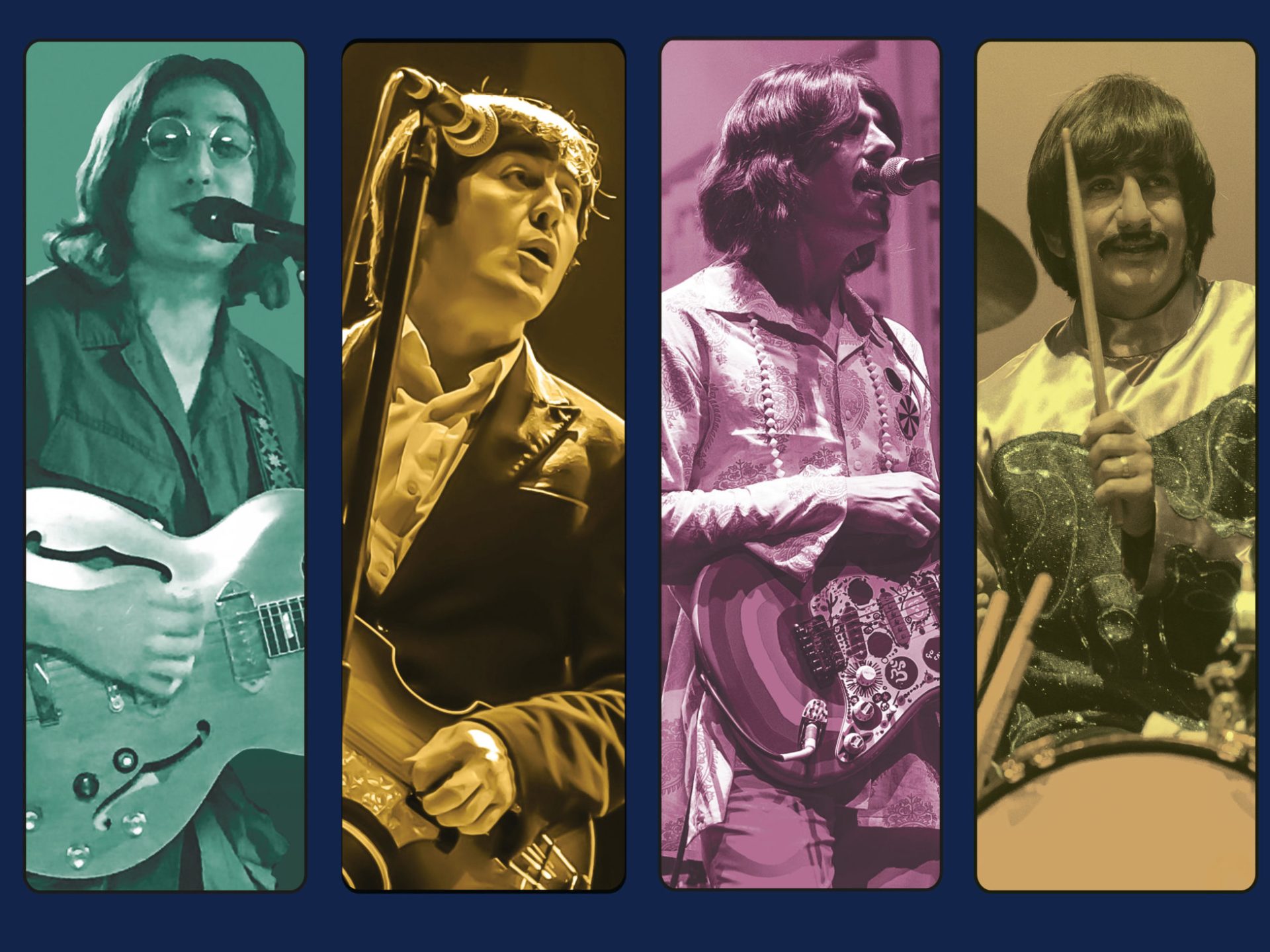Magazine

June 21, 2019

This article was originally published in Populous Magazine, our biannual publication featuring news, information, and trends from the worlds of sport, entertainment, and major public events. Find out more, and sign up to receive a free copy, here.
The Bootleg Beatles, Led Zepagain, Alter Eagles, ReGenesis, Elton Jeff, Queen B… there are now hundreds of tribute pop bands, impersonating their heroes and mimicking the original songs. Dominic Bliss wonders how these impostors became so popular.
Mick Jagger is wearing a studded leather corset on his mid-riff and a long scarf around his neck. His snake hips sport a silver sash and metal belt, his trousers so tight they might have been sprayed on.
Next to him, strumming along to (I Can’t Get No) Satisfaction, is Keith Richards in a polka dot jacket and stripy trousers, with multiple pendants and scarves draped around his neck. Along with the rest of the band, they look like they’ve stepped straight out of 1968.
Only this isn’t the real Rolling Stones. This is a tribute band called The Rollin Stoned. In real life, Jagger (his stage name is actually Mick Jaguar) is a postman called Francis White. Richards (stage name Keith Retched) is an artist called David Farren.
Not that the crowd they’re performing to minds too much. After all, they’ve paid just £13 (US$17) a ticket, and they’re all close enough to the stage to spot the fillings in Mick and Keith’s teeth.
It’s late December at the Half Moon, a small live-music venue at the back of a pub in west London. The Rollin Stoned are playing to an over-excited group of 150 or so fans, all ages, and all happy to suspend disbelief for an hour and a half, in the pretence that it’s the real Stones up on stage.
Tribute bands like this regularly mimic their heroes, performing cover versions at gigs all over the world. Some, such as The Bootleg Beatles, The Australian Pink Floyd Show, Led Zepagain and Bjorn Again are good enough facsimiles to enjoy huge fanbases and fill decent-sized arenas.
Others pale in comparison to their forerunners. Many trade under cheesy double-entendre band names. Carrie Davies is manager of The Rollin Stoned and another act called Absolute Bowie. She explains how musicians have been impersonating famous pop stars for decades, starting with Elvis Presley and Beatles copycats in the 1970s. But it was in Australia, in the late 1980s, that serious tribute acts first starting making names for themselves.
“Australia has long struggled to attract international touring artists to its shores as the travel costs for a band can be very prohibitive,” Carrie says.
The Australian Doors Show, the Australian Pink Floyd Show, and an ABBA act called Bjorn Again were among the first and most successful.
Lots of smaller music venues are struggling to survive. Neighbours might complain about the noise and that can close the whole building down. Sometimes tribute bands are the only way they can guarantee an audience.
During the 1990s, musicians in the UK and the US who had been knocking out original material in tiny venues quickly realised there was far more money to be made by impersonating established legends. “To start with they honoured bands you could no longer see live, such as The Beatles, Led Zeppelin and Abba,” Carrie adds. “Or bands that toured occasionally but whose ticket prices were very expensive, like The Stones.”
Initially rather disdainful of copycat bands, smaller venues soon welcomed them with open arms when they saw that their much-loved songs were attracting larger audiences than the unknown acts who normally turned up.
“Running a small music venue is incredibly hard,” says Carrie. “A decent tribute band on a Friday or Saturday night could mean the difference between the venue staying afloat or closing down.”
Michel Austin portrays Brian Jones in The Rollin Stoned. He considers tribute acts a lifeline for many ailing music venues. “Lots of smaller places are struggling to survive,” says this 58-year-old Londoner. “Neighbours might complain about the noise and that can close the whole building down. Sometimes tribute bands are the only way they can guarantee an audience.”
Chris Hewlett impersonates Paul McCartney in the second incarnation of The Bootleg Beatles who originally formed in the early 1980s with four other (now retired) impersonators. This 49-year-old admits he’s astounded at how successfully his own band has ridden the coattails of the original Fab Four.
“In the 1980s the first Bootleg Beatles used to play at universities and were laughed at by the students because, back then, no one really did tribute bands,” he says. “Now we play to 5,000 people at the Royal Albert Hall, and do two major tours every year.”
Carrie believes the tribute scene will continue to grow. “These bands spend so much time perfecting the mannerisms and commentary, as well as rehearsing the music and the nuance of the vocals.” She cites whole festivals dedicated to the genre in the UK, such as Glastonbudget, Tribfest and a series of shows called Fake Festivals.
Back at the Half Moon pub, Mick Jaguar, Keith Retched et al are halfway through a fairly decent rendition of You Can’t Always Get What You Want, the irony of which is perhaps lost on the audience. Michel Austin has now joined the band, as Brian Jones, only he’s dressed in silver, with angel wings on his back. It’s a nod to the fact that the real Brian Jones died in 1969. Before the show, Michel had lamented the fact that the original Stones had never witnessed his act. “If I was in the real Rolling Stones, I’d like to watch us,” he says. “But I don’t think that will ever happen.”
Despite no official seal of approval, tribute bands show no signs of slowing down. Could they ever become so popular that they end up spawning tribute acts of their own? A tribute to a tribute, so to speak.
In a way, the ABBA tribute act Bjorn Again already has. There are now several versions of Bjorn Again playing (sometimes simultaneously) at major venues all over the world. Carrie isn’t so sure. “The thought of a tribute to a tribute band – I hope I never see such a thing,” she says, somewhat perturbed by the idea. “But as existing bands fall out of fashion, new bands and their tribute acts will arrive on the scene. Tribute bands are definitely here to stay.”
Lorem ipsum dolor sit amet consectetur, adipisicing elit. Non facere corporis et expedita sit nam amet aut necessitatibus at dolore enim quis impedit eius libero, harum tempore laboriosam dolor cumque.
Lorem, ipsum dolor sit amet consectetur adipisicing elit. Illo temporibus vero veritatis eveniet, placeat dolorem sunt at provident tenetur omnis, dicta exercitationem. Expedita quod aspernatur molestias eum? Totam, incidunt quos.